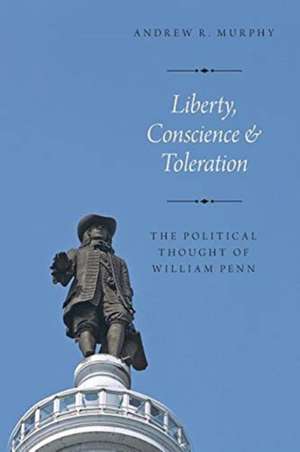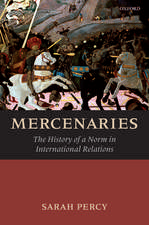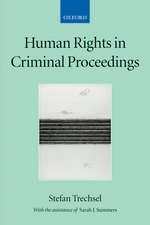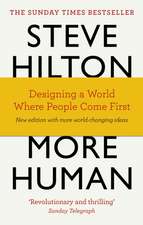Liberty, Conscience, and Toleration: The Political Thought of William Penn
Autor Andrew R. Murphyen Limba Engleză Paperback – 21 dec 2018
| Toate formatele și edițiile | Preț | Express |
|---|---|---|
| Paperback (1) | 174.95 lei 11-16 zile | |
| Oxford University Press – 21 dec 2018 | 174.95 lei 11-16 zile | |
| Hardback (1) | 582.27 lei 32-37 zile | |
| Oxford University Press – 28 iul 2016 | 582.27 lei 32-37 zile |
Preț: 174.95 lei
Preț vechi: 189.58 lei
-8% Nou
Puncte Express: 262
Preț estimativ în valută:
33.48€ • 35.20$ • 27.66£
33.48€ • 35.20$ • 27.66£
Carte disponibilă
Livrare economică 17-22 martie
Preluare comenzi: 021 569.72.76
Specificații
ISBN-13: 9780190935894
ISBN-10: 0190935898
Pagini: 320
Dimensiuni: 155 x 234 x 15 mm
Greutate: 0.48 kg
Editura: Oxford University Press
Colecția OUP USA
Locul publicării:New York, United States
ISBN-10: 0190935898
Pagini: 320
Dimensiuni: 155 x 234 x 15 mm
Greutate: 0.48 kg
Editura: Oxford University Press
Colecția OUP USA
Locul publicării:New York, United States
Recenzii
Liberty, Conscience, and Toleration is a masterful achievement, one as remarkable for its careful treatment and painstaking analysis of early modern toleration and liberty of conscience as for its insightful reflections on political theory, practice and genre. Assessing the wide sweep of Penn's writings and actions serves as an exemplary opportunity not only to reflect on theory and its complex and at times unexpected relationship to practice but also to see more clearly the ways in which political theorizing responds to context, shapes the embodied and performative dimensions of protest and resistance, resists entrenched and coercive power, and protects religion, prudence and civil interest.
In the process of interpreting William Penn as both political theorist and political activist, Murphy not only examines the importance of William Penn for understanding political theory and action in the early modern Atlantic world but also employs Penn's career as a model for understanding "the importance of social roles and locations in the genesis and reception of political theory". He has developed a productive strategy for interpreting early modern religious and political thought.
Liberty, Conscience and Toleration...joins Murphy s previous works as required reading for political theorists who want something more from intellectual history and value a kind of originality made possible only by serious engagement with the theories and practices of the past."
[Murphy] has developed a productive strategy for interpreting early modern religious and political thought."
Murphy's study makes a valuable contribution as a close dissection of Penn's central beliefs, influences and motivations throughout his career. The work raises pertinent questions regarding the interaction of, and distinction between, 'theoretical' and 'practical' spheres. Murphy diagnoses a continual flow between theory and practice - and his exhortation for greater scholarly consideration of Penn is largely grounded in his revised vision of what a 'theorist' must look like."
...a fine new study of Penn s religious and political thought... [Murphy] makes the first full, explicit, and persuasive case for seeing the man as 'a significant and sophisticated political thinker."
Perhaps the best feature of Liberty, Conscience & Toleration is that it places Penn in a historical context that makes it easier to understand his opponents, his theories, and his behavior . The William Penn who emerges from this account is a complex man, dedicated to egalitarian ideas of toleration yet deeply affected by his own belief in hierarchy and deference .Murphy's insightful intellectual biography gives scholars and general readers who just know Penn in the American context an opportunity to understand him on a deeper level by explaining clearly the English background that led Penn to participate in New World colonization. This complex Penn is even more intellectual and interesting than many may realize."
Murphy's work is both timely and well executed."
...makes ample use of the current scholarship on politics and religion in late seventeenth-century England...a fine contribution to the growing literature advocating a closer relationship between the study of seventeenth-century English politics and the early English Atlantic and imperial world."
[Provides a] careful analysis of Penn's writings and use of examples from early Pennsylvania to illustrate the difficulties implementing theories...[an] excellent guide to Penn's political theories."
Murphy presents a convincing argument that Penn the politician and political theorist belonged to the world of seventeenth-century England, its law, and thought, despite his twice two-year sojourn in Pennsylvania."
Jefferson called William Penn 'the greatest lawgiver the world has produced.' From his time to our own, Penn has enjoyed continuing acclaim. In this profound-and moving-meditation on this remarkable man, Andrew Murphy engages him exactly as he was: the only participant in the greatest era of English social thought who was at once a major political thinker and a major political player, wrestling all his life with the tension between theory and practice. Murphy brings to his study a magisterial command of the sources, a supremely sure judgment, and a fine flowing prose. He has written the best book on Penn of our time and of all time."
We have been awaiting a study like this for some time-an intellectual biography of William Penn that would take full account of recent work in Atlantic history and would use these new insights to conduct a re-evaluation of his career. There are few early modernists who bridge the divide between political theory and history as effectively as Andrew Murphy does. This is truly an Atlantic history, displaying Murphy's firm grasp of political and religious debates on both sides of the Atlantic. Written with admirable clarity, ^lLiberty, Conscience, and Toleration is a significant and original contribution to the literature on religious toleration, the founding of Pennsylvania, and American political theory. Its provocative arguments will be debated widely."
In this remarkable book, Andrew Murphy places Penn in a new light, even moving toward a notion of separation of church and state. He demonstrates a splendid capacity for close reading of the original texts and has complete mastery of both the primary texts and secondary materials. Most importantly, he is able to make complicated situations and seventeenth century texts really clear for the reader."
Murphy makes a powerful argument for Penn's importance in the development of toleration. Murphy also renders Penn appropriately human-sized, reminding us that, even though Thomas Jefferson proclaimed Penn 'the greatest lawgiver the world has produced' (240), the limits of toleration would continue expanding after Penn."-Brooke Sherrard, American Academy of Religion, Reading Religion
Murphy's work is both timely and well executed. It deserves to be read (and even reread) by scholars interested in the transatlantic economy of ideas...a close examination of Penn's life affords Murphy the chance to do what he does best - meditate on the meaning and place of liberty of conscience in an Atlantic world desperately seeking to come to terms with burgeoning religious diversity.
In the process of interpreting William Penn as both political theorist and political activist, Murphy not only examines the importance of William Penn for understanding political theory and action in the early modern Atlantic world but also employs Penn's career as a model for understanding "the importance of social roles and locations in the genesis and reception of political theory". He has developed a productive strategy for interpreting early modern religious and political thought.
Liberty, Conscience and Toleration...joins Murphy s previous works as required reading for political theorists who want something more from intellectual history and value a kind of originality made possible only by serious engagement with the theories and practices of the past."
[Murphy] has developed a productive strategy for interpreting early modern religious and political thought."
Murphy's study makes a valuable contribution as a close dissection of Penn's central beliefs, influences and motivations throughout his career. The work raises pertinent questions regarding the interaction of, and distinction between, 'theoretical' and 'practical' spheres. Murphy diagnoses a continual flow between theory and practice - and his exhortation for greater scholarly consideration of Penn is largely grounded in his revised vision of what a 'theorist' must look like."
...a fine new study of Penn s religious and political thought... [Murphy] makes the first full, explicit, and persuasive case for seeing the man as 'a significant and sophisticated political thinker."
Perhaps the best feature of Liberty, Conscience & Toleration is that it places Penn in a historical context that makes it easier to understand his opponents, his theories, and his behavior . The William Penn who emerges from this account is a complex man, dedicated to egalitarian ideas of toleration yet deeply affected by his own belief in hierarchy and deference .Murphy's insightful intellectual biography gives scholars and general readers who just know Penn in the American context an opportunity to understand him on a deeper level by explaining clearly the English background that led Penn to participate in New World colonization. This complex Penn is even more intellectual and interesting than many may realize."
Murphy's work is both timely and well executed."
...makes ample use of the current scholarship on politics and religion in late seventeenth-century England...a fine contribution to the growing literature advocating a closer relationship between the study of seventeenth-century English politics and the early English Atlantic and imperial world."
[Provides a] careful analysis of Penn's writings and use of examples from early Pennsylvania to illustrate the difficulties implementing theories...[an] excellent guide to Penn's political theories."
Murphy presents a convincing argument that Penn the politician and political theorist belonged to the world of seventeenth-century England, its law, and thought, despite his twice two-year sojourn in Pennsylvania."
Jefferson called William Penn 'the greatest lawgiver the world has produced.' From his time to our own, Penn has enjoyed continuing acclaim. In this profound-and moving-meditation on this remarkable man, Andrew Murphy engages him exactly as he was: the only participant in the greatest era of English social thought who was at once a major political thinker and a major political player, wrestling all his life with the tension between theory and practice. Murphy brings to his study a magisterial command of the sources, a supremely sure judgment, and a fine flowing prose. He has written the best book on Penn of our time and of all time."
We have been awaiting a study like this for some time-an intellectual biography of William Penn that would take full account of recent work in Atlantic history and would use these new insights to conduct a re-evaluation of his career. There are few early modernists who bridge the divide between political theory and history as effectively as Andrew Murphy does. This is truly an Atlantic history, displaying Murphy's firm grasp of political and religious debates on both sides of the Atlantic. Written with admirable clarity, ^lLiberty, Conscience, and Toleration is a significant and original contribution to the literature on religious toleration, the founding of Pennsylvania, and American political theory. Its provocative arguments will be debated widely."
In this remarkable book, Andrew Murphy places Penn in a new light, even moving toward a notion of separation of church and state. He demonstrates a splendid capacity for close reading of the original texts and has complete mastery of both the primary texts and secondary materials. Most importantly, he is able to make complicated situations and seventeenth century texts really clear for the reader."
Murphy makes a powerful argument for Penn's importance in the development of toleration. Murphy also renders Penn appropriately human-sized, reminding us that, even though Thomas Jefferson proclaimed Penn 'the greatest lawgiver the world has produced' (240), the limits of toleration would continue expanding after Penn."-Brooke Sherrard, American Academy of Religion, Reading Religion
Murphy's work is both timely and well executed. It deserves to be read (and even reread) by scholars interested in the transatlantic economy of ideas...a close examination of Penn's life affords Murphy the chance to do what he does best - meditate on the meaning and place of liberty of conscience in an Atlantic world desperately seeking to come to terms with burgeoning religious diversity.
Notă biografică
Andrew R. Murphy is Professor of Political Science at Rutgers University. His previous books include Prodigal Nation: Moral Decline and Divine Punishment from New England to 9/11 and Conscience and Community: Revisiting Toleration and Religious Dissent in Early Modern England and America.













